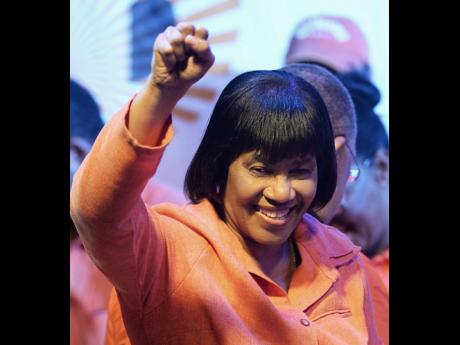FORECAST: PNP WIN! - Portia set to remain PM after election, University team projects 40 seats for the PNP
It appears the PNP is still likely to win the next general election and will capture at least 40 of the 63 seats in the House of Representatives, unless there is a major shock over the next four days.
The previous CHAMPSKNOW forecast gave the PNP a 60 per cent probability of winning.
This report is a revised and updated forecast, which takes into account the PNP’s refusal to participate in the debates (in an oral culture), the ‘house attack’ on the JLP leader and the counterattacks.
These strategies further alienated the issue voters from the parties. The PNP now has a 56 per cent chance of winning and the JLP a 44 per cent chance. The 12 per cent greater chance of the PNP winning is not the same as the PNP receiving 12 per cent more popular votes.
With an expected low voter turnout, both parties are relying on hard-core supporters with the PNP having the edge since the party is more united around its leader.
The PNP has been in power for 22 of the last 26 years (including the last four) and so by default has more policies, so 65 per cent of its TV and social media ads are positive ones about its policies that have received external support and support from some civil society groups.
The JLP mostly has its record in opposition (four years of the last 26 in government) and its internal politics.
Party leaders that have not settled the leadership issue usually lose the election. The JLP has countered the PNP with its prosperity message.
The majority of JLP ads (62%) are positive about the party’s policies. However, the JLP’s largest ad category should have been contrast ads that were used to distinguish the party from the PNP by saying how its policies and style of governance are different from the PNP and will be better and more effective.
The JLP should have launched the details of its prosperity policy a year ago with Holness and Dr Christopher Tufton taking the message across the country signifying a unified party with a viable alternative. Not much weight was given to the party manifestos in the revised forecast because the voters know that the parties subsequently ignore their manifestos.
CHAMPSKNOW forecasts does not give seat counts so a seat projection method was developed (which is a work in progress) using the scientific literature and consultations.
The base rate of wins and the vote leads in all constituencies in all general elections from 1962-2011 were calculated. Constituencies consistently held by the PNP and the JLP with high base rates and huge vote leads backed by scores of party gunmen were classified as garrison seats.
The constituencies consistently held by the two major political parties with huge votes leads and high base rates with or without small pockets of party gunmen were classified as traditional seats.
The garrison and traditional seats make up the safe seats held by the PNP and the JLP. There are also the battleground constituencies that were classified as marginal seats because they swing between the JLP and the PNP across general elections with vote leads of 10 per cent or less.
The limitation of this trend analyses that stops at the 2011 general election was covered by contextual data (or current on the ground data) to project which party will win the majority of the seats on February 25, 2016, particularly the marginal seats.
All safe seats with huge vote leads near to marginal seats were identified and the number of votes that could be safely traded to secure victories in nearby marginal seats were calculated.
This gives the seat projection that the PNP will win 40 seats and the JLP will win 23 seats in the 2016 general election.
A probability estimate of victory (12%), when it occurs can lead to a large seat count for the winner depending on how the votes cast are distributed or configured across constituencies in the first past the post Westminster system. This probability estimate should hold if there are no major scandals or adverse events before election day.
- Dr. Christopher A.D. Charles is a senior lecturer in political psychology and Gleasia Reid is an MPhil/PhD student in political science at the University of the West Indies, Mona.

